Editor’s Note: In this article, Senator Iroegbu, Maureen Okpe and Global Sentinel team, analysed in comprehensive fashion, the Geopolitics Series 2.0, hosted by the Media Centre for Development (MCD), which brought together a consortium of esteemed experts and thought leaders to dissect Africa’s intricate challenges in harnessing its vast resources for sustainable development. As the world’s attention pivots to Africa’s potential as a global player, the series delved into the multifaceted factors contributing to the continent’s underdevelopment and fragility. The discussions revolved around the mismanagement of resources, historical exploitation by global powers, the paradox of resource-rich yet economically challenged countries, and the critical role of effective leadership. Through comprehensive analyses, compelling insights, and cross-disciplinary perspectives, the series illuminated the complexities surrounding Africa’s economic growth and its geopolitical positioning. The resulting takeaways underscored the need for accountable leadership, good governance, equitable trade relationships, educational reform, and collaboration both within the continent and with international partners. Ultimately, the Geopolitics Series 2.0 serves as a call to action, advocating for collective efforts to drive Africa’s journey towards prosperity, stability, and a stronger global presence.
Africa’s development conundrum: Insights from Geopolitics Series 2.0
The underdevelopment plaguing Africa can be attributed to a complex interplay of factors, including the mismanagement of abundant resources within African countries and the historical dominance of global powers that continue to shape Africa’s economic and political landscape. These critical issues were the focal point of discussion during the second edition of the Geopolitics Series webinar, organised by the Media Centre for Development (MCD) and coordinated by Global Sentinel, Public Intel Security Africa, and Ayanda Media Network. The webinar, themed “Africa Fragility: Resource Curse or Resource Mismanagement?”, brought together a distinguished panel of experts and participants who collectively shed light on the challenges hindering Africa’s ability to harness its resources for sustainable economic growth and development. Notable speakers included Paul Turner, President and Executive Director of The Fund for Peace in Washington DC; Prof. PLO Lumumba, President of the PLO Lumumba Foundation and Director of the Kenya School of Law in Nairobi; Prof. Adriano Nuvunga, Director of CDD and Chairperson of the Mozambique Human Rights Defenders Network in Maputo; and David Endeley Otto, International Terrorism Consultant at Stepp in Stepp Out UK Ltd in London.
The inherent paradox is that across the African continent, individual states are endowed with a plethora of invaluable natural and human resources, ranging from crude oil and gas to lithium, uranium, gold, diamonds, copper, cocoa, and more, all present in significant commercial quantities. Moreover, Africa stands out as one of the few continents characterised by a burgeoning youth population, accompanied by a growing educated segment. Yet, in a deeply regrettable state of affairs, the continent grapples with the unfortunate distinction of being the world’s poorest across almost all development indices. Rather than flourishing due to the advantages at its disposal, the continent is mired in conflicts, misgovernance, unemployment, and a host of other societal ills.
One of the pressing issues explored during the webinar was the lasting legacy of colonialism, which saw European powers exploit Africa’s resources with little consideration for the long-term consequences. The aftermath of this exploitative era left behind borders that often disregarded ethnic and cultural realities, creating economic disparities that persist today. The panelists underscored the fact that historical exploitation continues to influence Africa’s present challenges, as the continent struggles to break free from the chains of a traumatic past.
Resource mismanagement emerged as a focal point of concern during the discussion. Despite the immense wealth of natural resources, many African nations have faltered in their attempts to translate these resources into meaningful development. Corruption, fund misallocation, and weak governance have collectively hindered effective resource utilisation, thereby perpetuating a cycle of underdevelopment.
Moreover, the influence of global powers on Africa’s development trajectory cannot be overlooked. The historical dominance of Western nations and the contemporary economic supremacy of major players like China exert considerable influence on Africa’s economic and political systems. The unequal nature of trade relationships, wherein Africa exports raw materials while importing finished products, further exacerbates the developmental imbalance.
At the heart of Africa’s potential lies its youthful demographic dividend. The continent’s vibrant and dynamic youth population hold the promise of driving innovation and progress. However, underdeveloped educational systems, limited democratic engagement, and declining voter turnout in elections collectively undercut the potential of this demographic advantage.
To address these challenges and forge a path toward sustainable development, the panelists emphasised the necessity of a paradigm shift in governance. This includes fostering a long-term vision, prioritising transparency, and demanding accountability from leadership. Effective governance emerged as the linchpin for converting resources into tangible developmental gains.
The inherent paradox is that across the African continent, individual states are endowed with a plethora of invaluable natural and human resources, ranging from crude oil and gas to lithium, uranium, gold, diamonds, copper, cocoa, and more, all present in significant commercial quantities. Yet, in a deeply regrettable state of affairs, the continent grapples with the unfortunate distinction of being the world’s poorest across almost all development indices. Rather than flourishing due to the advantages at its disposal, the continent is mired in conflicts, misgovernance, unemployment, and a host of other societal ills.
Harnessing human capital and technology were also highlighted as vital strategies for progress. The African continent not only possesses abundant natural resources but also boasts a wealth of human talent. The speakers stressed the importance of investing in education, technology, and innovation, thereby leveraging the potential of the youth through quality education and skill development opportunities.
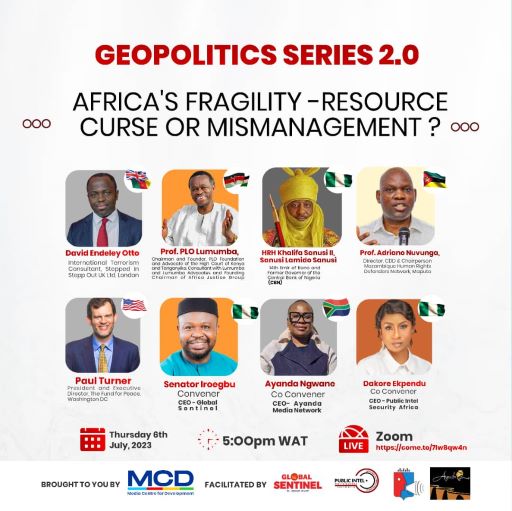
In a nutshell, the Geopolitics Series webinar provided a comprehensive exploration of the multifaceted challenges obstructing Africa’s development. From the echoes of historical exploitation to contemporary issues of resource mismanagement and global power dynamics, the intricate tapestry of challenges was unveiled. It became evident that Africa’s trajectory can be recalibrated through visionary leadership, transparent governance, and collective action. While historical legacies and global dynamics play significant roles, the African nations themselves must take charge of their destiny. Nurturing human capital, fostering innovation, and building international partnerships were identified as key steps towards breaking the cycle of underdevelopment.
As Africa aspires to secure its rightful place on the global stage, the Geopolitics Series underscored the urgency of comprehensive transformation. Armed with abundant resources and a dynamic young population, the continent possesses the potential to redefine its trajectory—ushering in an era of sustainable development, economic prosperity, and social progress. Though the journey may be arduous, the promise of a brighter future for generations to come makes it a journey worth embarking upon.
Unveiling answers to Africa’s underdevelopment
In a quest to address the perplexing questions surrounding Africa’s persistent underdevelopment and to provide a forward-looking perspective amid global economic growth and the evolving world order, the Geopolitics Series was conceived. Organised by the MCD in collaboration with three distinguished media platforms – Global Sentinel, Public Intel Security Africa, and Ayanda Media Network – each specialising in defence and security, international relations and development, as well as human rights and justice. The primary aim of this series is to dissect the intricacies of global affairs that impact various facets including peace, security, economy, governance, and development, all with a distinct focus on Nigeria and the broader African context.
The inaugural edition of the Geopolitics Series, aptly themed “AU@60: The African Continent Conflicts in the 21st Century,” was a tribute to the 60th Anniversary of the African Union. This milestone event gathered renowned experts such as Jakkie Cilliers, Fidel Amakye Owusu, Onyinye Onwuka, and Dennis Speed, who delved into comprehensive insights, research findings, and analyses of the African Union’s management of continental conflicts and challenges in the context of the 21st century. Building on the success of this event, the second edition centered on Human Security, with a particular focus on Economic Security. The objective was to explore why Africa, despite its vast resources, grapples to realize its full potential.
It noted that Africa, despite its significant population, is yet to establish itself as a major global influencer, remaining in the shadows of powerhouses like the US, China, and the European Union. This second edition critically examined the hurdles Africa faces in effectively harnessing its resources to foster sustainable economic growth and development, all within the context of its limited global stature. Dr. Jackie Cilliers, the Founder/Chair of the Board at the Institute for Security Studies (ISS), highlighted Africa’s global relevance in the realms of great power competition, energy supply, counterterrorism initiatives, and development goals like the Millennium and Sustainable Development Goals. This section of the series endeavors to unveil the reasons behind Africa’s constrained impact on the global stage.
Moreover, Africa’s contribution to the global economy, as measured by Gross Domestic Product (GDP), remains disappointingly low. According to Statistics Times, which highlights the world’s economic dynamics, Africa contributes a mere 2.84% of the global GDP in nominal terms, positioning it as the second smallest continental economy after Oceania. In terms of Purchasing Power Parity (PPP), Africa ranks as the third smallest continental economy. These statistics underscore the urgency of dissecting the causes behind Africa’s economic insignificance in the global arena.
Central to the core theme of the Geopolitics Series is an exploration of why resource-rich African nations continue to grapple with fragility and economic marginalisation.
Distinguished experts delved into the phenomenon known as the “resource curse” – a complex dynamic where the mismanagement of natural resources exacerbates Africa’s challenges. Through meticulous case studies, including Nigeria with its oil wealth and the contentious fuel subsidy regime, the Democratic Republic of Congo (DRC), the Sahel region, and North African countries, a comprehensive analysis was presented. The discussions encompassed crucial sub-themes: “An Overview of Africa’s Fragility: Causes, Challenges, and the Way Forward”; “Corruption and Misgovernance in Africa: The Way Forward”; “Nigeria’s Oil Wealth, Fuel Subsidy, and Economic Woes – The Way Forward”; “Fragility in Mozambique, DRC, and the Great Lakes Region”; and “Challenges in the Sahel Region, North, and the Horn of Africa.” Each sub-theme peeled back the layers of factors that hinder Africa’s economic advancement and wealth creation.
As Africa aspires to secure its rightful place on the global stage, the Geopolitics Series underscored the urgency of comprehensive transformation. Armed with abundant resources and a dynamic young population, the continent possesses the potential to redefine its trajectory—ushering in an era of sustainable development, economic prosperity, and social progress. Though the journey may be arduous, the promise of a brighter future for generations to come makes it a journey worth embarking upon.
At the core of Geopolitics Series, is the commitment of thought leaders and experts in seeking solutions to Africa’s complex challenges. As it dives into the core of Africa’s underdevelopment, the series endeavors to unravel the intricate factors that hold back the continent’s progress. From examining historical burdens to dissecting resource mismanagement and global power dynamics, the series creates a platform for actionable dialogue. It is a call for transformation, where Africa’s abundant resources and vibrant youth population converge with visionary leadership and robust governance to rewrite the narrative of underdevelopment. With the promise of a brighter future and shared prosperity, the Geopolitics Series illuminates the path forward for Africa’s sustainable development journey.
Factors and dynamics behind Africa’s underdevelopment
The complexities behind Africa’s underdevelopment are woven from a tapestry of influences, both internal and external. The Geopolitics Series brought together a panel of experts to scrutinise the tangled web of reasons, offering insights into the factors responsible for the mismanagement of Africa’s human and material resources. Delving into this intricate narrative, the series unearthed key factors that have contributed to the continent’s struggles.
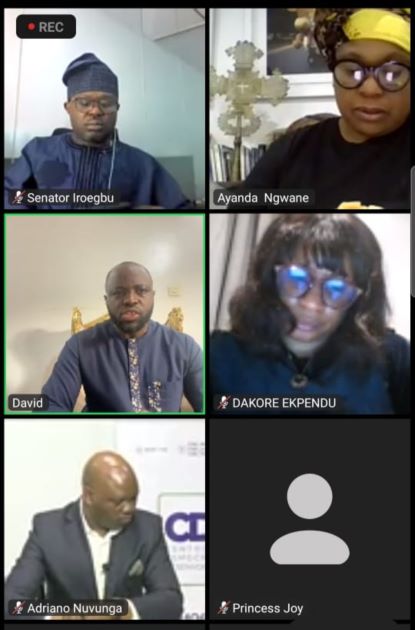
Internal culprits -governance and corruption: At the heart of Africa’s resource mismanagement lie issues of governance, corruption, and political instability. This unholy trinity has cast a shadow on development efforts, impeding investments in pivotal sectors like education, healthcare, and infrastructure. The repercussions of such mismanagement ripple through societies, corroding the very fabric of progress. The experts’ insights emphasise that this mismanagement extends beyond mere inefficiencies; it leads to the diversion and embezzlement of public funds, compounding the challenge of underdevelopment.
Colonial legacy: A significant facet of Africa’s struggle can be traced back to its tumultuous history with colonial powers. The legacy of colonialism continues to cast a long shadow, as European nations exploited Africa’s resources and manipulated its political landscapes for their gain. The consequences reverberate to this day, with arbitrary borders and ethnic divisions sowing discord and hampering unity. The echoes of colonial subjugation have left nations economically weakened and politically fragmented, further impeding development.
Global dynamics-unequal trade and neocolonialism: The imprint of global powers on Africa’s development is undeniable. Unequal trade relationships have locked African nations into a cycle of dependency, rendering them exporters of raw materials and importers of finished products. This imbalance stifles diversification and industrialisation, relegating Africa to a subordinate economic role. Beyond trade, neocolonialism’s grip has impacted African political trajectories. The influence of external powers, often driven by self-interest, has manipulated political processes, stymying stability and progress. This complex weave of power dynamics places the continent at a disadvantage.
However, pointing solely at historical legacies and global pressures oversimplifies the narrative. Africa bears its own responsibility for development. The path forward necessitates prudent governance, investment in human capital, and fostering regional unity. Choices rooted in long-term prosperity, as opposed to short-term gains, must guide African nations. To challenge the hegemony of global powers, fair trade relationships and collaborations are essential.
The African conundrum-internal will and external pressures: Yet, a more nuanced layer emerges. The series recognises that Africa’s challenges cannot be solely attributed to historical burdens or external pressures. Internal factors, such as lack of political will and pragmatic leadership, fuel the flames of misgovernance. The delicate balance between preserving cultural identities and embracing modern practices also comes into play.
In dissecting Africa’s underdevelopment, the Geopolitics Series presents a call to action. It underscores the importance of local governance reforms, the cultivation of transparent and accountable leadership, and nurturing democratic values. Simultaneously, the global community must endorse fair trade policies and offer genuine collaboration, not neocolonial subjugation. The crux of the solution lies in the convergence of proactive internal efforts and empathetic external support.
In the quest to mend the fractures of underdevelopment, acknowledging historical injustices and current global imbalances is imperative. But the ultimate transformation emerges from within African nations. The series lays bare the collective responsibility of Africans and the international community in shaping a future where progress, prosperity, and dignity are not just aspirations, but realities.
At the core of Geopolitics Series, is the commitment of thought leaders and experts in seeking solutions to Africa’s complex challenges. As it dives into the core of Africa’s underdevelopment, the series endeavors to unravel the intricate factors that hold back the continent’s progress.
Resource mismanagement and pathways to development
In the discourse on Africa’s development, Mr. David Otto, an international expert on security and counterterrorism, delved into the continent’s fragility, spotlighting indicators like corruption, ethnic conflicts, and economic instability. Otto highlighted that despite abundant resources, the continent faces challenges in healthcare and education, with outdated systems hindering growth. He noted, “During COVID, Africa’s health system struggled due to lack of infrastructure. Educational systems are outdated, still echoing colonial curriculum despite resource wealth. Issues like poor health and education hinder development despite resource abundance. We talk about African fragility, which is tied to indicators such as high corruption, as seen in global corruption indexes.” He added, “Countries with mineral and natural resources often show conflict, instability, and ethnic-driven tensions. Despite abundant resources, inflation and price hikes are common, reflecting poor economic stability.”
The security expert further discussed the mismanagement of Africa’s vast resources, raising questions about the definition of natural resources and the relationship between resource abundance and economic growth. He stated, “Rather than resource curse, the problem is more about mismanagement, and the focus should shift from natural resources to human resource development.” He drew on the success stories of resource-poor countries like Rwanda and the West to bolster his point. Otto also examined the impact of mindset, unity, and workforce utilisation on governance and development.
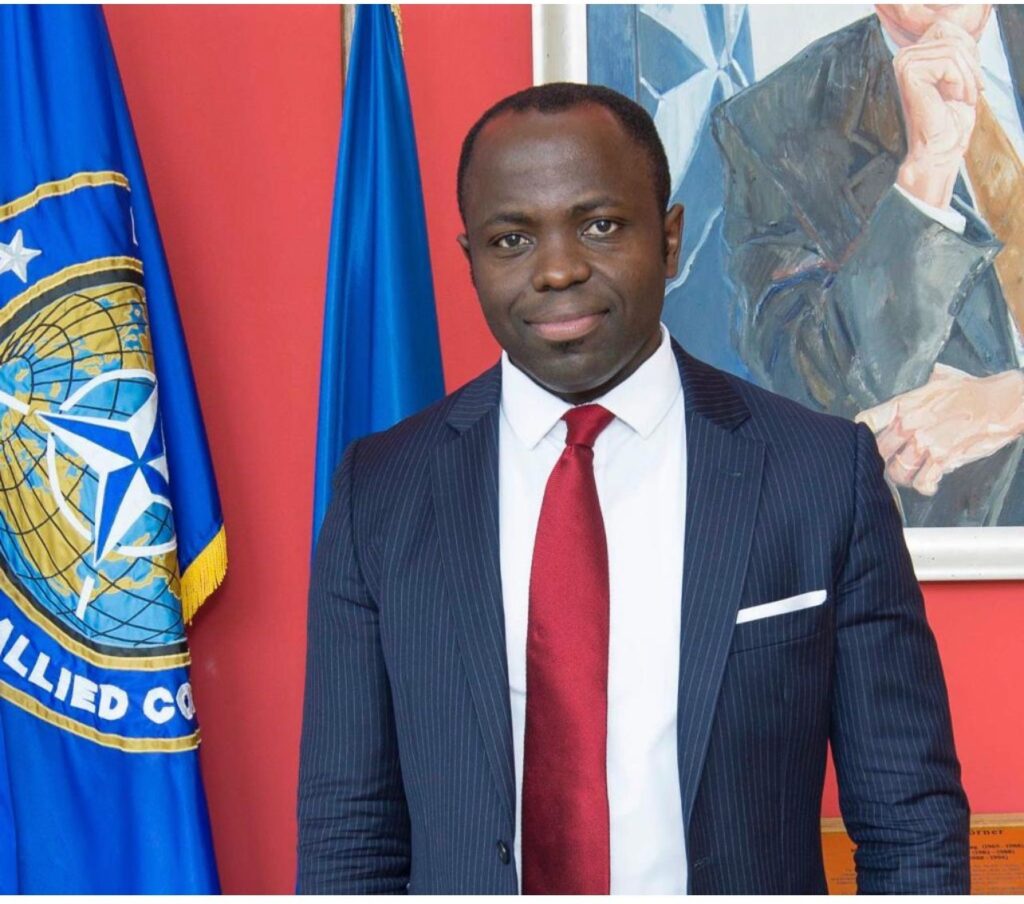
He contended, “What defines natural resources? Is it only minerals, or should it include agriculture and people? The relationship between growth and resources isn’t straightforward; governance and diversification matter. Africa faces issues like high unemployment, low living standards, and inadequate infrastructure. Resource-rich countries like Nigeria struggle to maximise.”
“Another area where I think it’s quite important is our economic policy, where a lot of African countries rely so much on oil, for example, Nigeria has oil at the top of its revenue source, countries like Mali have gold and all that resources, including countries like Ghana. What are all these countries in Africa doing in terms of developing and adding value to the natural resources? Own resources for growth.”
According to him, Africa with its large natural reserves and economic contribution to the world is still lagging behind and does not have the recognition it should. He said an overhaul should be carried out to determine the strength Africa possesses to enable it to map out efficient development plans, as well as reduce the dependency on oil and source ways of harnessing other mineral deposits in the region.
He further emphasised the need for Africa to move away from imported and exposed national security strategy, as most of Africa’s military security agencies have been trained from outside their respective countries.
“When you have that kind of scenario where you do not have an independent national security strategy, where you copy and paste from outside the Western world, what happens is that you employ a watchman that does not factor in your national interest. You employ a watchman who has learned from the bandit.”
“We have a continent that is blessed, yet we do not have a say in geopolitics. Countries in Africa have high resources yet lag in terms of how they are being perceived by the United Nations Security Council. We do not have a permanent seat in that council yet; we have all the resources comparatively higher in terms of representation. We also do not get the best out of the IMF and other institutions.”
“Rather than resource curse, the problem is more about mismanagement, and the focus should shift from natural resources to human resource development.”
David Otto
He concluded by stressing on the multifaceted nature of Africa’s fragility, attributing it in part to resource mismanagement. To address these issues, he shared on the need for improved governance, a shift in mindset, enhanced unity, and better utilisation of the continent’s abundant workforce.
He noted that “Africa’s fragility is multifaceted, with resource mismanagement as a key component. Mindset and culture affect governance; is democracy suitable after decades of independence? Mindset’s link to resources and governance; do colonial attitudes persist? These are the questions begging for answers as we know that African unity is a challenge as blocs like ECOWAS need more cohesion. The youthful workforce is underutilised despite Africa’s abundant human capital.”
“To address these issues, we must examine governance, mindset, unity, and workforce utilisation,” Otto asserted.
Africa’s role in great power competition
Paul Turner, President and Executive Director of the Fund for Peace Washington DC, analysed Africa’s recent challenges during the discussion, shedding light on the impact of COVID-19 and its influence on the Fragile States Index rankings due to various formidable challenges. Turner underscored that Africa, like the rest of the world, has faced struggles, highlighting the pressing issue of rising food prices, linked to disruptions in global supply chain and wheat prices caused by events like the Russian invasion in Ukraine.
He opined that a layer of complexity added to the global struggle, as countries worldwide endeavored to overcome these challenges. He said that inflation affected nearly every country, with many African nations experiencing double-digit rates. As different countries sought ways to stabilise trade and currencies, he started, inflation became a focal concern. Turner however, noted that leaders’ responses to these challenges varied, either engaging with their populations or becoming increasingly disconnected, leading to protests and potentially higher levels of fragility or instability.
He stated, “Over the past year, we’ve seen fuel prices spike in numerous countries, sometimes to a crippling degree that impacts individuals and industries. Like the rest of the world, this has been economically challenging for Africa. Leaders are grappling with how to navigate these issues.”
“Unfortunately, this period has also exposed leaders’ abilities, and some have managed to connect with their populations to share their ideas and hopes for the future. However, there’s been a growing disconnect, resulting in protests, localised food riots, and demonstrations against fuel prices. This uncertainty often breeds instability and heightened fragility, prompting us to question whether the current leadership is suitable to guide us through these challenges.”
“I know that we have been facing similar issues in the United States, and similar questions are being asked. Amid challenges, there’s always opportunity. However, these challenges come intermittently over time.”
Turner underscored ongoing global power shifts and their implications for international relations and diplomacy. He urged African leaders to leverage the competition between major powers for economic gain. He cited examples like Kenya benefiting from China’s Belt and Road Initiative and Zambia receiving increased funding from the US and China in foreign assistance.
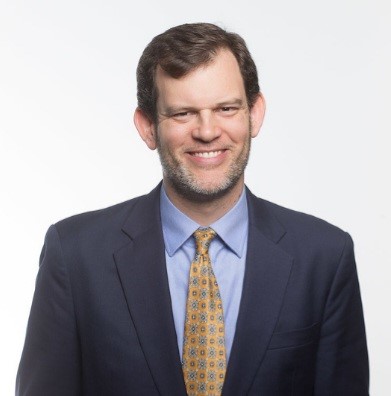
He also acknowledged the transformative potential of technology in both urban and remote areas across Africa, driving economic growth and advancement. Turner stressed the critical importance of effective resource management, particularly concerning rare earth minerals, to ensure equitable benefits and minimise corruption. He also discussed how technology solutions can address corruption and support informed decision-making. He pointed out that resources could be both a blessing and a curse, depending on their management within specific contexts. The involvement of local communities in resource governance was highlighted as crucial for influencing leadership and industry practices.
Turner shared, “A significant global shift is taking place. The Cold War is behind us, and now we’re grappling with what’s often referred to as great power competition. This geopolitical positioning not only impacts politics and alliances but will significantly affect economies. If skillfully navigated and negotiated by African leaders, these impacts could work to their advantage.”
“Lastly, the idea of resources being a curse or a blessing is context-dependent. It’s not a universal sentiment across Africa. We can find instances where resources have brought incredible blessings to communities, even on sub-national and national levels, creating various opportunities. Simultaneously, we can find heart-wrenching stories where resources have been misused and abused, benefiting only economic or political elites. It’s up to each community to determine.”
“A significant global shift is taking place. The Cold War is behind us, and now we’re grappling with what’s often referred to as great power competition. This geopolitical positioning not only impacts politics and alliances but will significantly affect economies. If skillfully navigated and negotiated by African leaders, these impacts could work to their advantage.”
Paul Turner
He concluded by looking forward to the insights that other panelists would provide through specific case studies and experiences, shedding light on the economic challenges and opportunities in different African countries.
A call for change
Prof. PLO Lumumba, Chairman and Founder of the PLO Foundation, explored the topic of African countries’ exploitation by global powers and the resulting resource mismanagement. He highlighted the importance of equitable agreements that favour African nations in their dealings with entities such as the Western world, China, and Russia, especially when it comes to the extraction of resources like cobalt or gold.
Lumumba underscored that Africa is often perceived as a source of raw materials; a phenomenon often termed the “resource curse.” However, he contended that this perception arises not due to external curses but as a result of mismanagement within African countries. He pointed out that poor contracts entered into by the political class have enabled foreign corporations to exploit the oil sector. Examples were cited, such as Total Energies, Shell, and ExxonMobil in Nigeria and Ghana. In the realm of agriculture, despite being significant producers, countries like Togo, Côte D’Ivoire, and Ghana do not experience substantial value addition, as the benefits largely accrue to foreign entities like Belgians and Swiss.
Lumumba remarked, “Africa is often seen globally as a repository of raw materials, be it minerals or agricultural produce. This is why you’ve mentioned the term ‘resource curse’ in your discussion. Depending on the perspective, it could be seen as a curse or as a result of mismanagement. In my view, nobody has cursed us. What we are witnessing in many African countries is a failure to make the most of the opportunities we possess.”
“The political class has misused these opportunities by entering into unfavourable contracts. In the oil sector, we have witnessed how foreign corporations like Total Energies, Shell, and ExxonMobil have taken advantage of the countries in which they operate, whether in Nigeria or Ghana.”
“When we turn to the agricultural sector, where the largest combined producers are Togo, Côte D’Ivoire, and Ghana, we observe minimal value addition. The main beneficiaries are often the Belgians and Swiss. Take cocoa, for instance, where value addition has been limited until recently. We are now seeing increased value addition in Ethiopia. Tanzania has also made some strides, though modest.”
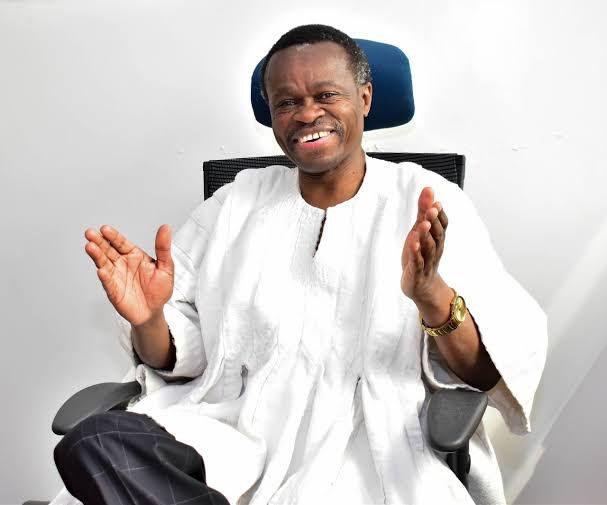
Lumumba attributed this issue to Africa’s political organisation, which makes it vulnerable to manipulation, resulting in inadequate benefits from its resources. “Across Africa, political organisation susceptibility to manipulation plays a significant role,” he added. He referred to historical efforts like the Legacy Plan of Action in 1980, which aimed to enhance intra-African trade. He emphasized the necessity of industrialization, energy infrastructure, and value addition to move away from raw product trading.
He urged African nations to approach negotiations from an organised stance to counter manipulation, intimidation, and unfavourable terms. Lumumba highlighted the significance of tapping into Africa’s human resources and not solely focusing on minerals. He concluded by asserting that mismanagement, not a curse, lies at the heart of Africa’s challenges and emphasised the urgency for change.
“Africa is often seen globally as a repository of raw materials, be it minerals or agricultural produce. This is why you’ve mentioned the term ‘resource curse’ in your discussion. Depending on the perspective, it could be seen as a curse or as a result of mismanagement. In my view, nobody has cursed us. What we are witnessing in many African countries is a failure to make the most of the opportunities we possess.”
PLO Lumumba
Lumumba stressed that for African countries to enter into business agreements as a united continent, especially in resource extraction like cobalt or gold, these agreements must prioritise the benefits for host countries or communities.
“Africa is vulnerable to manipulation, and it fails to fully reap the benefits it should from its resources. Consequently, people do not gain as much as they could. This raises questions about the way forward. As early as 1980, African countries recognised that intra-African trade was minimal. The Legacy Plan of Action aimed to boost this trade and consequently drive industrialisation, energy development, and value addition. This approach is crucial to avoid trading in raw materials. For example, if Liberia produces rubber, a primary ingredient for tire production, we must ensure that companies like Michelin and Firestone transfer technology through local arrangements. Given the ongoing industrial revolution, it’s time to organise our affairs to harness its dividends.”
He continued, “Can these countries standardise in a way that benefits the entire African continent? These are the questions we face. I believe it’s time to move beyond lamentation, complaint, and criticism. We understand our adversaries. The global economic landscape is competitive, and Africans must negotiate from a position of unity.”
“By doing so, we can stand strong against manipulation, intimidation, and unfavourable terms. Fragility only emerges when one chooses to be fragile. When we recognise the necessary actions, we must take them. We possess ample human resources that we can harness. One resource often overlooked is our human capital. While we often speak of Africa’s mineral resources, we boast some of the finest men and women globally. Leveraging them could swiftly unlock Africa’s potential. It’s not a curse; it’s mismanagement. The time for change is now.”
Harnessing Africa’s youth potentials
Prof. Adriano Nuvunga, Director, Centre for Democracy and Human Rights (CDD), addressed the fragility of African nations in the current global landscape, particularly the challenges impeding the realisation of prosperity, participation, and human rights, despite the wave of democratisation that swept through the continent approximately 35 years ago. He identified the critical role and potential of Africa’s youthful population, while also underlining the hindrances that need urgent attention.
Nuvunga stressed that Africa’s population growth, particularly its youth bulge, presents both opportunities and challenges. However, he pointed out that the African Union’s aim to harness the potential of youth participation is obstructed by insufficient democratic spaces. Despite the exponential growth in population, voter turnout in African elections is on a decline, painting a stark contrast to the trajectory of population growth. This phenomenon, according to Nuvunga, is intricately linked to the deteriorating quality of education across the continent.
“In Africa, we are witnessing an unprecedented population growth, primarily consisting of young people who constitute a pivotal segment of the population. We must tap into the immense potential these young individuals hold, leveraging their energy and knowledge. However, the democratic avenues to do so are inadequate. Voter turnout in African elections is plummeting, a trajectory contradictory to our population growth.”
“This issue is deeply intertwined with the quality of education. Currently, education in Africa is driving us away from progress. Despite exponential population growth, the quality of education is regressing, spelling a significant concern.”
Nuvunga also highlighted the pressing concern of debt distress, noting that numerous African nations struggle to sustain themselves due to the burdensome weight of debt servicing coupled with limited revenue for development. He cited the example of Mozambique, where a substantial portion of revenue is allocated to debt servicing and civil servant salaries, leaving minimal room for meaningful progress.
He addressed domestic challenges, ranging from ineffective leadership and corruption to resource mismanagement and wastage. Nuvunga criticised the short-term mindset of some African leaders and the squandering of resources, particularly evident in sectors such as oil and gas. He championed the necessity of visionary leaders who prioritize long-term objectives and refrain from engaging in corrupt practices.
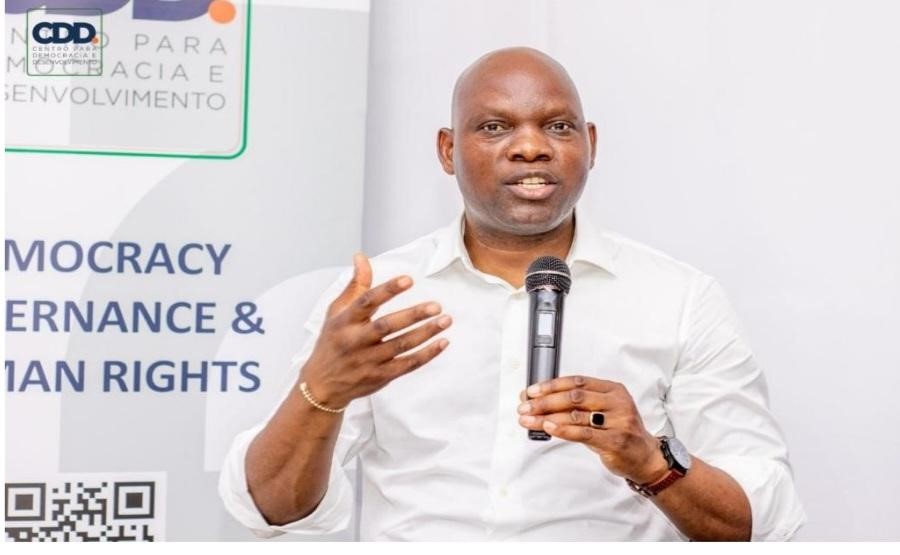
Nuvunga proceeded to discuss the international factors amplifying Africa’s fragility, underscoring global governance systems that permit the exploitation of the continent. He cited instances of investment flows that disproportionately benefit foreign nations and the role of tax havens in limiting African countries’ revenue potential.
“In Africa, we are witnessing an unprecedented population growth, primarily consisting of young people who constitute a pivotal segment of the population. We must tap into the immense potential these young individuals hold, leveraging their energy and knowledge. However, the democratic avenues to do so are inadequate. Voter turnout in African elections is plummeting, a trajectory contradictory to our population growth.”
Adriano Nuvunga
He concluded by reiterating the urgency of reshaping the global governance system to ensure Africa reaps the benefits of its resources. He noted that the fragility faced by African countries, including Mozambique, is a culmination of both internal and external factors.
Nuvunga’s insights shed light on the complex challenges facing African nations and underscore the critical importance of addressing education quality, governance, and international cooperation to unlock the immense potential of Africa’s youth and resources.
Unraveling Africa’s Paradox: Rich in resources, poor in progress
Senator Iroegbu, the Convener of the Geopolitics Series, had earlier commenced the event by acknowledging Africa’s abundant natural resources, juxtaposed with the challenges impeding their effective utilization. “Despite the continent’s vast wealth, ranging from oil to gold and cocoa, the question that looms are how these resources can be harnessed to propel Africa onto the global stage as a leader,” he queried.
In his recap and question-and-answer segment, Iroegbu skillfully interwove key points raised by previous speakers. He highlighted a question posed by Otto regarding the origin of African leadership, prompting an exploration of the connection between leadership and the exploitation of the continent’s natural resources. This exploration led to a deeper analysis of the complex relationship between resources, leadership, and economic growth.
Highlighting the coexistence of resource-rich and resource-poor countries, Iroegbu, who also holds the mantle of Editor-In-Chief of Global Sentinel, underscored the paradox of economic growth. He posed the intriguing query of why certain nations devoid of abundant natural resources managed to flourish, while others, endowed with ample resources, struggled to progress. This inquiry spurred a comprehensive examination of the intricate interplay between resources, leadership quality, and the trajectory of economic development.
A prevailing theme of the discussion was Africa’s fragility, particularly concerning its invaluable resources. The continent’s wealth in minerals, oil, gas, and agricultural products promised a path to substantial economic development. However, the actual realisation often fell short of these expectations, notably exemplified in Nigeria. Here, a recurrent sentiment echoed the lament over detrimental leadership thwarting progress.
“Despite the continent’s vast wealth, ranging from oil to gold and cocoa, the question that looms are how these resources can be harnessed to propel Africa onto the global stage as a leader.”
Senator Iroegbu
Quoting a poignant local adage widely recognised in Nigeria, Iroegbu underlined the frustration wrought by poor leadership: “We have everything we need, but our progress is hindered by bad leadership.” This encapsulated the prevailing sentiment among citizens, who witnessed the nation’s abundant resources juxtaposed with the adverse repercussions of inadequate leadership.
Co-Convener Ms. Dakore Ekpendu offered a recap that echoed the sentiment that Africa possessed the requisite resources for growth but was impeded by inadequate leadership. As the CEO of Public Intel Security Africa, she highlighted how even the youngest members of communities observed the incongruity between available resources and the lack of progress, tracing this incongruity back to ineffective leadership.
Similarly, Co-Convener Ms. Ayanda Ngwane emphasised the profound nexus between leadership, resources, and Africa’s developmental hurdles. As the CEO of Ayanda Media Network, she rallied for a collective awakening to the fact that addressing fragility necessitated confronting the leadership deficit at the core of the continent’s challenges. The event seamlessly transitioned into a dynamic question-and-answer segment, propelled by the shared commitment to uncover solutions for Africa’s journey towards growth and stability.
Key takeaways and recommendations
The Geopolitics Series 2.0, organized by the MCD and facilitated by Global Sentinel, Public Intel Security Africa and Ayanda Media Network, convened esteemed experts and thought leaders to delve into Africa’s complex challenges and potential solutions. Here are the key takeaways and recommendations drawn from the discussions:

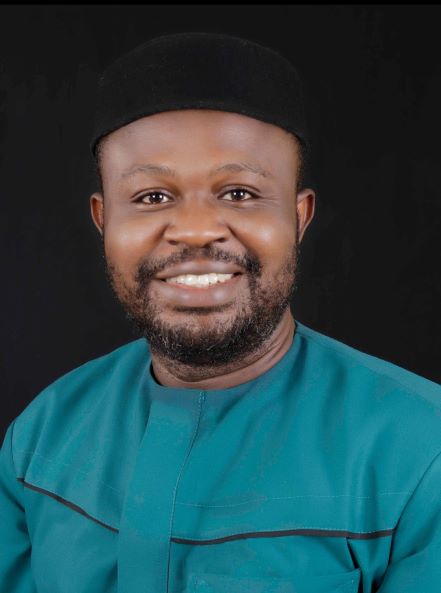
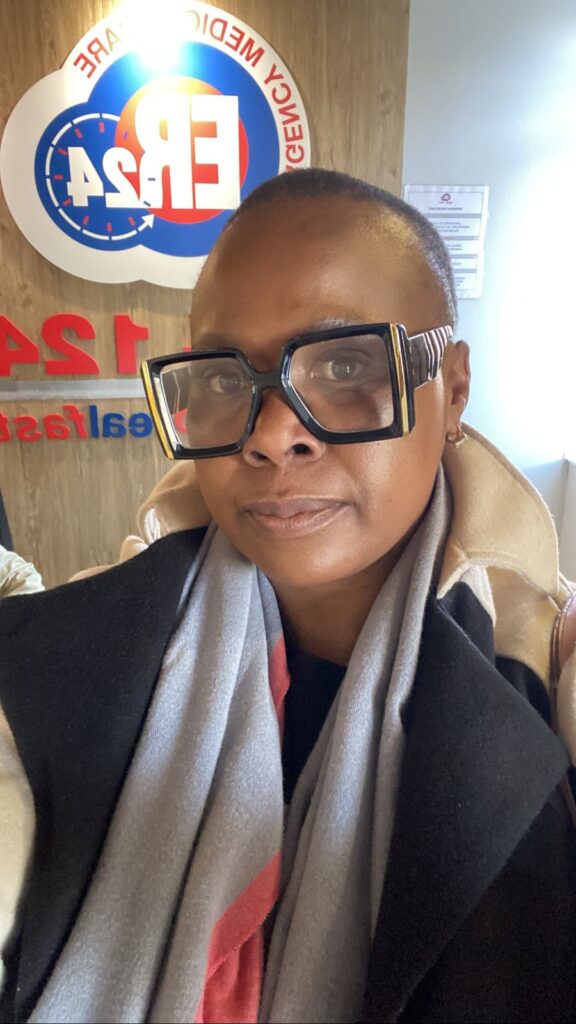
L-R: Ekpendu, Iroegbu and Ngwane
Resource mismanagement and fragility: Africa’s resource-rich status has not translated into commensurate economic growth due to mismanagement, corruption, and inadequate governance. Fragility is evident in Africa’s struggle to maximize its vast resources for the benefit of its citizens. Recommendation: African nations must prioritise transparency, good governance, and prudent resource management to counteract the “resource curse.” This involves fostering accountable leadership, effective regulations, and mechanisms to prevent the exploitation of resources for personal gains.
Leadership and development: Effective leadership plays a pivotal role in determining whether resource abundance translates into prosperity or stagnation. Also, bad leadership, often characterised by corruption and short-term focus, hinders progress and leads to frustration among citizens. Recommendation: African countries must prioritise the development of visionary and accountable leadership. Long-term planning, focus on citizen welfare, and sustainable development strategies are essential for translating resource wealth into tangible progress.
Youth population and democratic spaces: Africa’s youth population presents both potential and challenges. However, inadequate democratic spaces hinder youth participation and engagement. Voter turnout in elections is declining, highlighting the need for improved education quality and enhanced civic engagement. Recommendation: African governments should invest in quality education, focusing on both traditional and democratic values. Encouraging youth participation through robust civic education programs can lead to informed and active citizenship.
Global power dynamics and exploitation: African countries have historically faced exploitation by global powers, resulting in unequal trade relationships and limited control over their resources. External factors, such as investment flows and tax havens, further diminish African countries’ revenue potential. Recommendation: African nations should seek fair trade agreements, diversify their economies, and advocate for a restructured global economic system that promotes equitable exchanges and discourages exploitation.
Industrialisation and value addition: Many African countries export raw materials without significant value addition, limiting economic growth and job creation. Lack of industrialisation hampers progress, as value-added industries can enhance economic stability and resilience. Recommendation: African governments should prioritise industrialisation and value addition to their resources. Encouraging local processing and manufacturing can lead to higher-value products, increased employment, and reduced dependency on raw material exports.
Human capital and collaboration: Africa’s abundant human resources remain underutilised. Harnessing the talents and skills of the population is crucial for sustainable development. Collaboration between African countries and international partners is essential for addressing common challenges and fostering development. Recommendation: African nations should invest in education, skills training, and capacity-building to unlock the potential of their human capital. Collaborative efforts can lead to knowledge sharing, technology transfer, and collective problem-solving.
In conclusion, the Geopolitics Series 2.0 highlighted the multifaceted challenges and opportunities that Africa faces in its quest for development. Effective leadership, resource management, educational reform, fair trade practices, and collaboration are pivotal in overcoming these challenges and positioning Africa as a prominent global player. By prioritizing these recommendations, African nations can work towards harnessing their potential and achieving sustainable growth and stability.
“In a nutshell…It became evident that Africa’s trajectory can be recalibrated through visionary leadership, transparent governance, and collective action. While historical legacies and global dynamics play significant roles, the African nations themselves must take charge of their destiny. Nurturing human capital, fostering innovation, and building international partnerships were identified as key steps towards breaking the cycle of underdevelopment.”


[…] first two editions, we interrogated the African Union’s six-decade journey and investigated resource mismanagement in Africa. With this third edition, examined the resurgent coups in Africa, exposing their dynamics […]